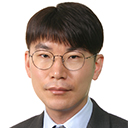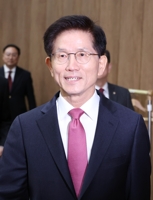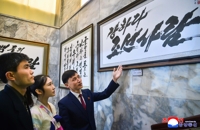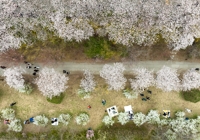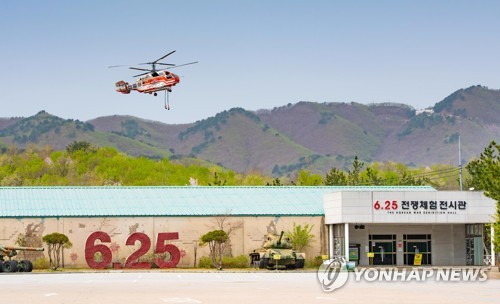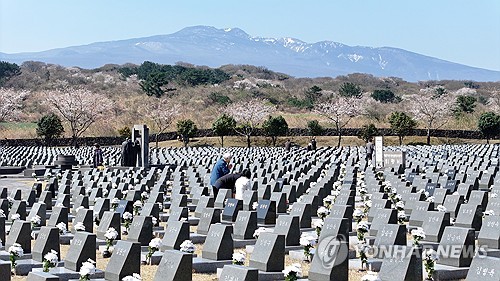(News Focus) U.S. experts forecast rough ride ahead for S. Korea-U.S. alliance amid leadership vacuum in Seoul
By Song Sang-ho
WASHINGTON, April 4 (Yonhap) -- U.S. experts on Friday anticipated a tough road ahead for the Seoul-Washington alliance in the coming months, noting the bilateral relationship would remain in limbo until South Korea elects a successor to now-dismissed President Yoon Suk Yeol.
Some pointed to Yoon's ouster in accordance with constitutional procedures as another sign of South Korea's democratic resilience, while uncertainty bounds over the alliance that faces multiple headwinds, including U.S. President Donald Trump's escalating tariff salvo.
The Constitutional Court unanimously upheld the impeachment of Yoon on Friday (Korea time), unseating him from office over his short-lived martial law imposition in December and setting the stage for a presidential election likely in June.

This file photo, taken Feb. 20, 2025, shows then President Yoon Suk Yeol appearing at the Constitutional Court in Seoul. (Pool photo) (Yonhap)
"The relationship will remain in suspension until South Korea elects a new leader, with the acting government managing daunting challenges as best as it can until the vacuum in Korea's political leadership is filled," Scott Snyder, the president and CEO of the Korea Economic Institute of America, told Yonhap News Agency.
Albeit under sharp scrutiny and attack from the opposition camp, acting President Han Duck-soo is now tasked to steer South Korea through the highly charged presidential election period. Yet, experts raised questions over the capacity of the caretaker government to successfully cope with daunting alliance tasks.
"In terms of the alliance, we will have to wait two to three months before we will know. In the meantime, the acting government and Korean economy will suffer for the next two months under a bevy of U.S. tariffs on steel and aluminum, Mexico-based Korean exports, car exports, and the reciprocal tariffs," Victor Cha, Korea Chair at the Center for Strategic and International Studies, told Yonhap News Agency via email.
"It will be hard for an acting president who will not be in office in two months to get an audience with Trump to cut some deal on exemptions. I am certain that this will be a big issue in the election campaign."
The verdict on Yoon came as Seoul officials have been scurrying to secure exemptions from the Trump administration's new levies or at least minimize their repercussions on Asia's fourth-largest economy at a time of deepening economic interdependence with the United States.
On Wednesday, Trump unveiled a 25 percent "reciprocal" tariff for South Korea, with his government's tariffs on imported cars having taken effect the following day. He is also moving to slap tariffs on semiconductors, pharmaceuticals and other products -- all bound to impact Korea's export-reliant economy.
Missing in the tariff saga was direct leader-to-leader engagement between Seoul and Washington, which some observers said might have helped ease Trump's tariff pressure and more smoothly address other bilateral issues, including security coordination.

U.S. President Donald Trump delivers remarks on tariffs in the Rose Garden at the White House in Washington on April 2, 2025, in this photo released by Reuters. (Yonhap)
"Yoon's impeachment means there will continue to be a leadership vacuum for at least two more months in Seoul making it difficult for South Korea to fully respond to Trump's fast-paced, hard charging foreign and economic policies," Andrew Yeo, the SK-Korea Foundation chair at the Brookings Institution's Center for East Asia Policy Studies, told Yonhap News Agency.
"The U.S.-South Korea alliance under Biden already feels like a bygone past as Trump has chosen to bypass or stay mostly silent about the U.S.-ROK alliance other than criticize Seoul for its trade imbalance," he added. ROK is short for South Korea's official name, the Republic of Korea.
In various public appearances, Trump has exhibited his negative perception toward South Korea as a trading partner as the U.S. trade deficit with South Korea was tallied at US$66 billion last year, a nearly 30 percent rise from the previous year, according to the Office of the U.S. Trade Representative.
That perception was on full display when he told Congress last month that South Korea's average tariff rate is four times higher than that of the U.S. -- a charge that Seoul countered by saying that it stands at less than 1 percent under a bilateral free trade agreement (FTA) with the U.S.
South Korea's average tariff on its most-favored nations (MFNs) stands at around 13.4 percent -- compared with the U.S.' 3.3 percent on its MFNs -- but that rate is not applicable to countries with FTAs with Korea.
Yeo expressed hope that the next South Korean president will be able to engage Trump and manage the alliance in a manner that addresses concerns on the Korean Peninsula and in the region through close coordination.
Some analysts voiced confidence in South Korea's democracy and its acting president who served as the ambassador to the U.S. from 2009-2012.
"With Yoon's unanimous impeachment ruling by the court, Korea has restored itself as a beacon of democratic resilience," Rob Rapson, a retired U.S. diplomat who formerly served as charge d'affaires at the U.S. Embassy in Seoul, told Yonhap News Agency.
"Now onto elections in 60 days. In the interim period, until a new president and government is in place, Han Duck-soo should be a capable steward/manager of state affairs, including relations with the U.S."

Acting President and Prime Minister Han Duck-soo delivers a televised address to the nation following the Constitutional Court's ruling that ousted former President Yoon Suk Yeol on April 4, 2025. (Yonhap)
Observers concurred that Friday's court ruling on Yoon is not a conclusion of the political crisis in South Korea, which has taken a heavy toll on the Seoul-Washington partnership.
In the midst of political uncertainty in Seoul, U.S. Defense Secretary Pete Hegseth skipped South Korea in his recent trip to the Indo-Pacific, adding to concerns over the potential impact of Seoul's impeachment turmoil. His predecessor, Lloyd Austin, also excluded a stop in South Korea during his Asian swing late last year.
"Unanimous decision by the Court was important rather than a divided one, but this does not end the crisis," Cha said. "We move from stage 1 which was the 4.5 month impeachment crisis to stage 2 which is the election."
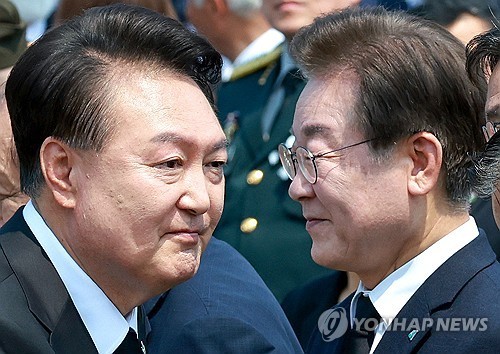
President Yoon Suk Yeol (L) and Lee Jae-myung, leader of the main opposition Democratic Party, attend a ceremony to mark Memorial Day at the National Cemetery in Seoul, in this file photo dated June 6, 2024. The Constitutional Court upheld the impeachment of Yoon on April 4, 2025, removing him from office over his short-lived imposition of martial law in December. (Yonhap)
sshluck@yna.co.kr
(END)
-
 Park Hae-soo calls villainous role in Netflix's 'Karma' 'liberating'
Park Hae-soo calls villainous role in Netflix's 'Karma' 'liberating' -
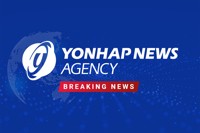 (URGENT) Main opposition welcomes Constitutional Court's decision to oust Yoon as 'victory of people'
(URGENT) Main opposition welcomes Constitutional Court's decision to oust Yoon as 'victory of people' -
 2 Chinese teens booked for illegally filming fighter jets at Suwon air base
2 Chinese teens booked for illegally filming fighter jets at Suwon air base -
 (URGENT) Court says Yoon violated law by sending troops to Nat'l Assembly to stop reversal of martial law
(URGENT) Court says Yoon violated law by sending troops to Nat'l Assembly to stop reversal of martial law -
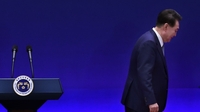 (4th LD) Constitutional Court upholds Yoon's impeachment, removes him from office
(4th LD) Constitutional Court upholds Yoon's impeachment, removes him from office
-
 Park Hae-soo calls villainous role in Netflix's 'Karma' 'liberating'
Park Hae-soo calls villainous role in Netflix's 'Karma' 'liberating' -
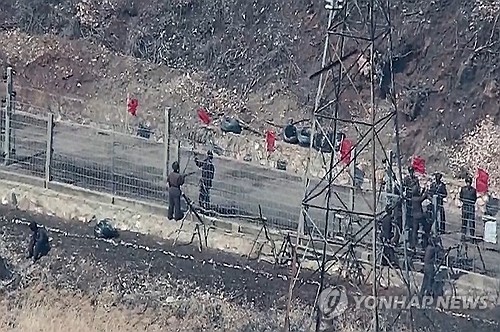 (2nd LD) S. Korea's military fires warning shots at N. Korean soldiers as they cross military demarcation line
(2nd LD) S. Korea's military fires warning shots at N. Korean soldiers as they cross military demarcation line -
 (2nd LD) Constitutional Court upholds Yoon's impeachment, removes him from office
(2nd LD) Constitutional Court upholds Yoon's impeachment, removes him from office -
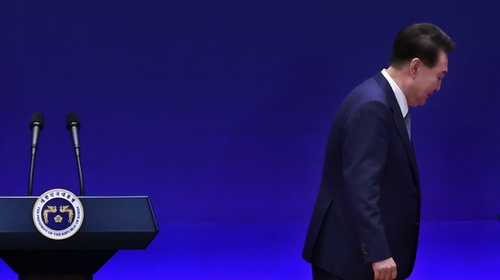 (4th LD) Constitutional Court upholds Yoon's impeachment, removes him from office
(4th LD) Constitutional Court upholds Yoon's impeachment, removes him from office -
 (5th LD) Constitutional Court upholds Yoon's impeachment, removes him from office
(5th LD) Constitutional Court upholds Yoon's impeachment, removes him from office
-
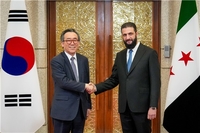 S. Korea establishes diplomatic ties with Syria in foreign policy milestone
S. Korea establishes diplomatic ties with Syria in foreign policy milestone -
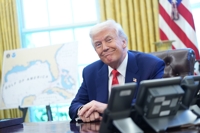 Trump signals U.S. will make defense cost-sharing part of talks for 'package' deal on trade, other issues
Trump signals U.S. will make defense cost-sharing part of talks for 'package' deal on trade, other issues -
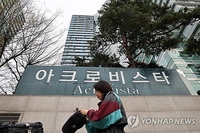 (LEAD) Ex-President Yoon to leave presidential residence Friday
(LEAD) Ex-President Yoon to leave presidential residence Friday -
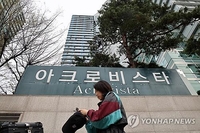 Yoon to leave presidential residence as early as Friday
Yoon to leave presidential residence as early as Friday -
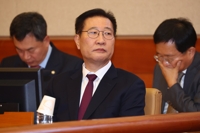 (LEAD) Constitutional Court rejects justice minister's impeachment over martial law involvement
(LEAD) Constitutional Court rejects justice minister's impeachment over martial law involvement
